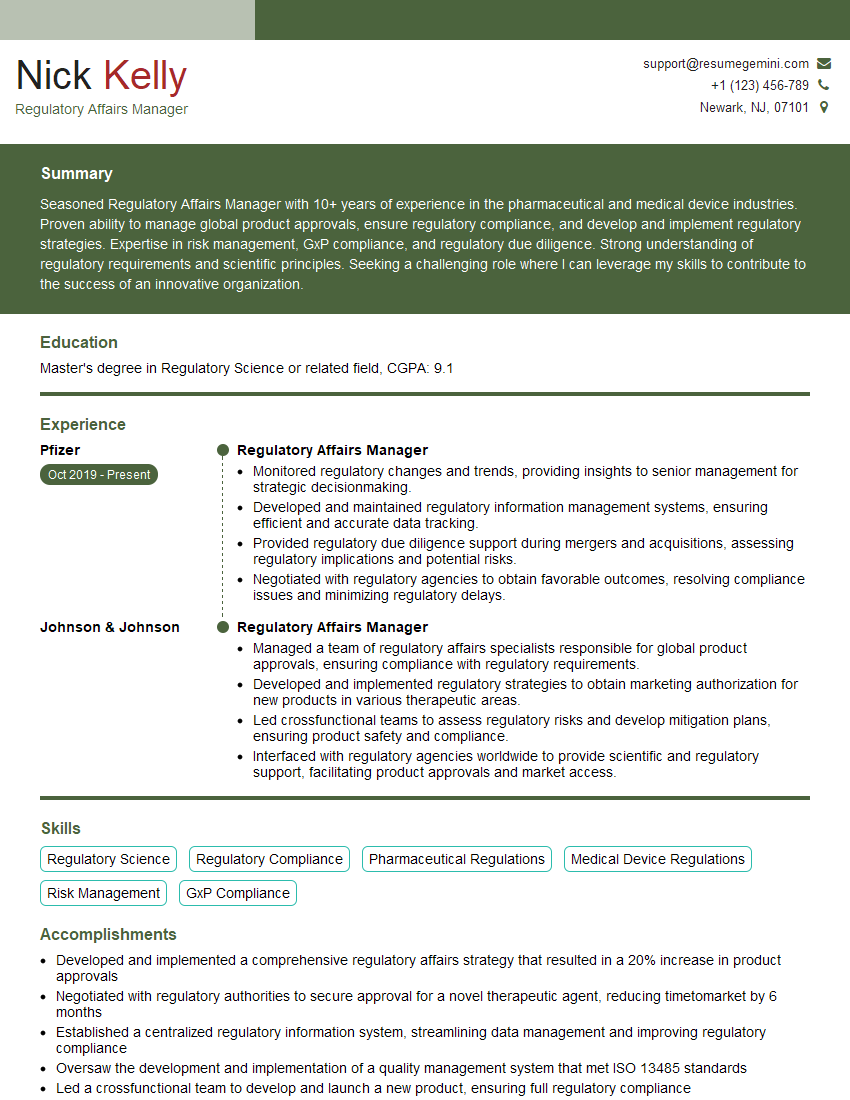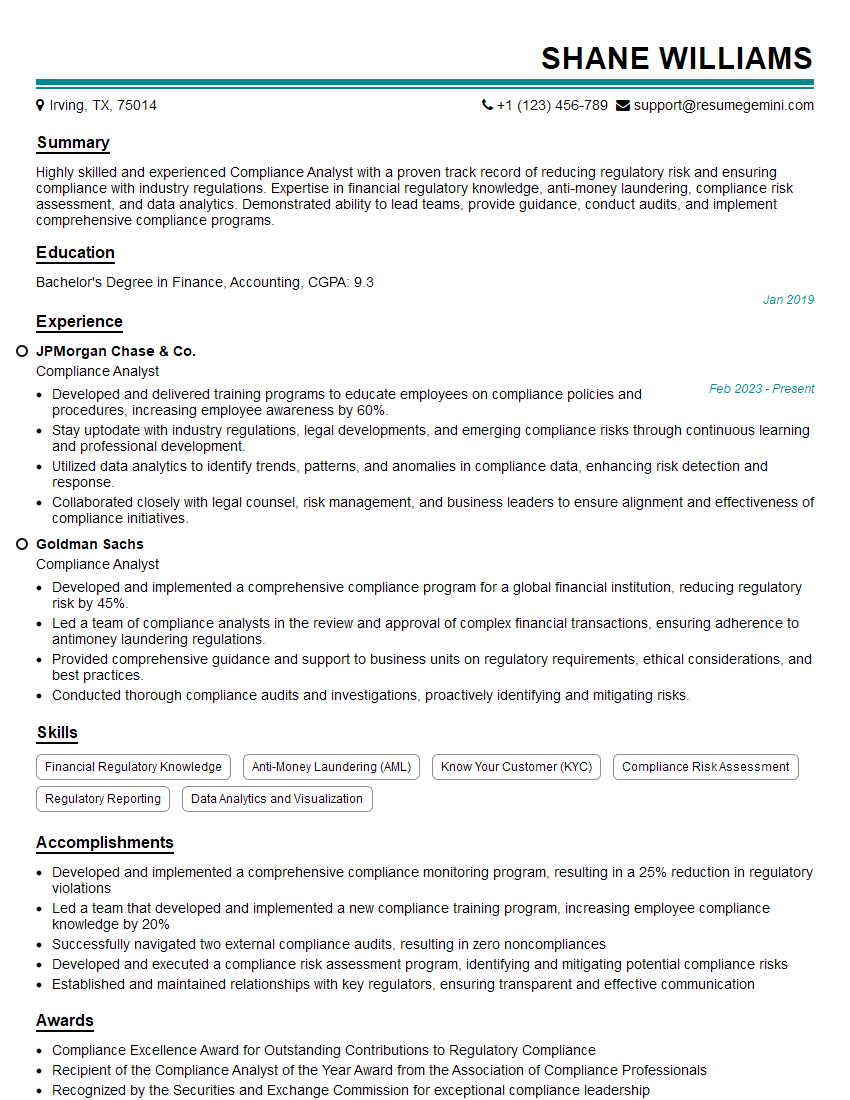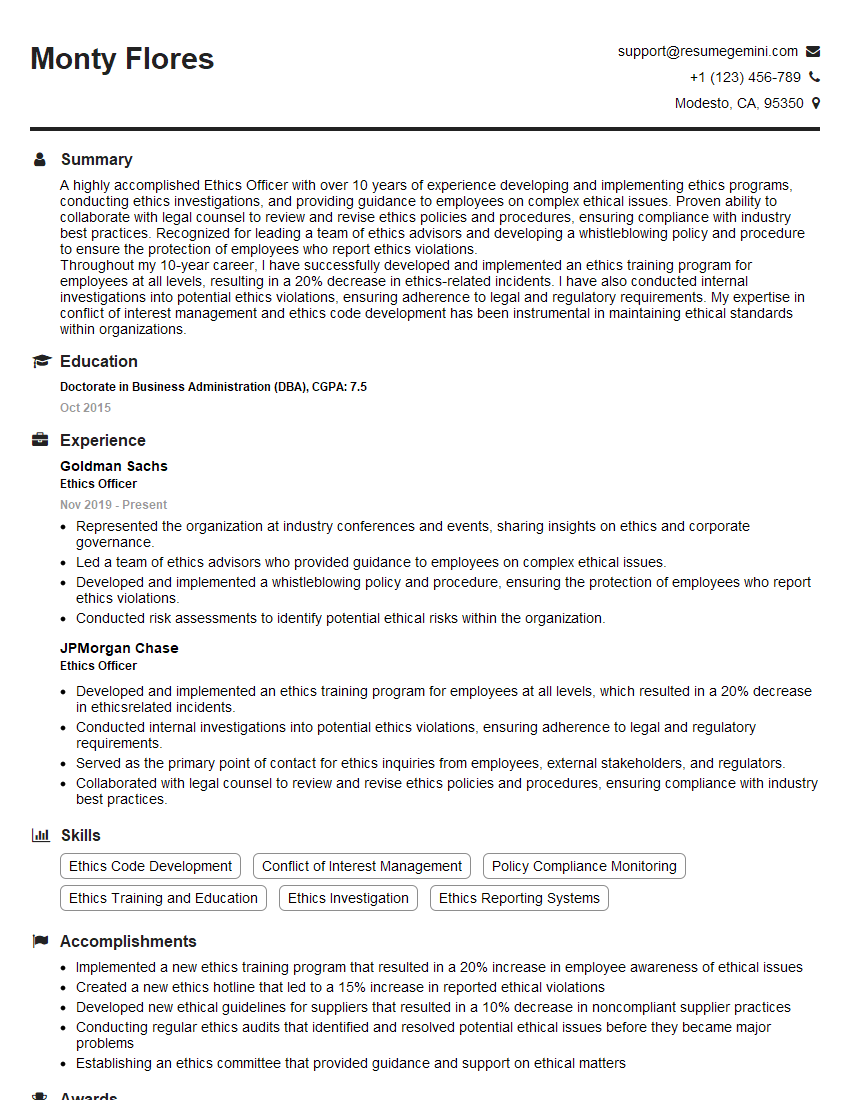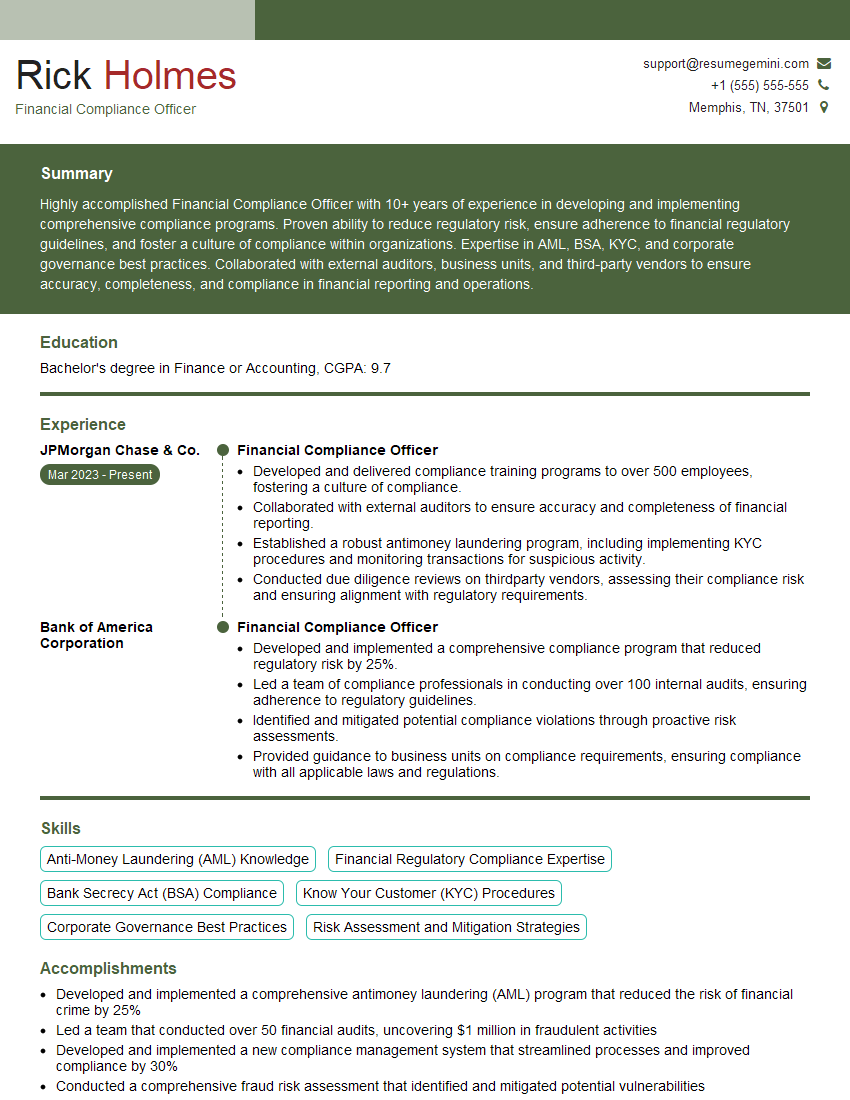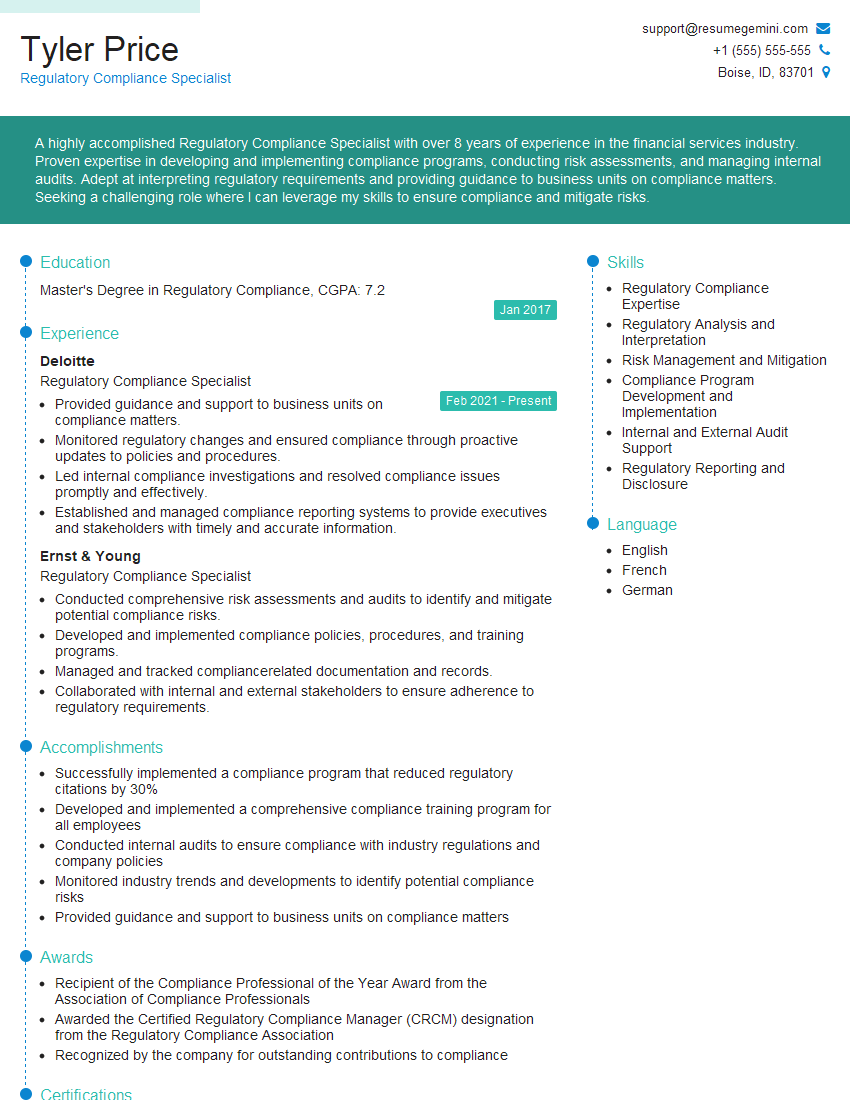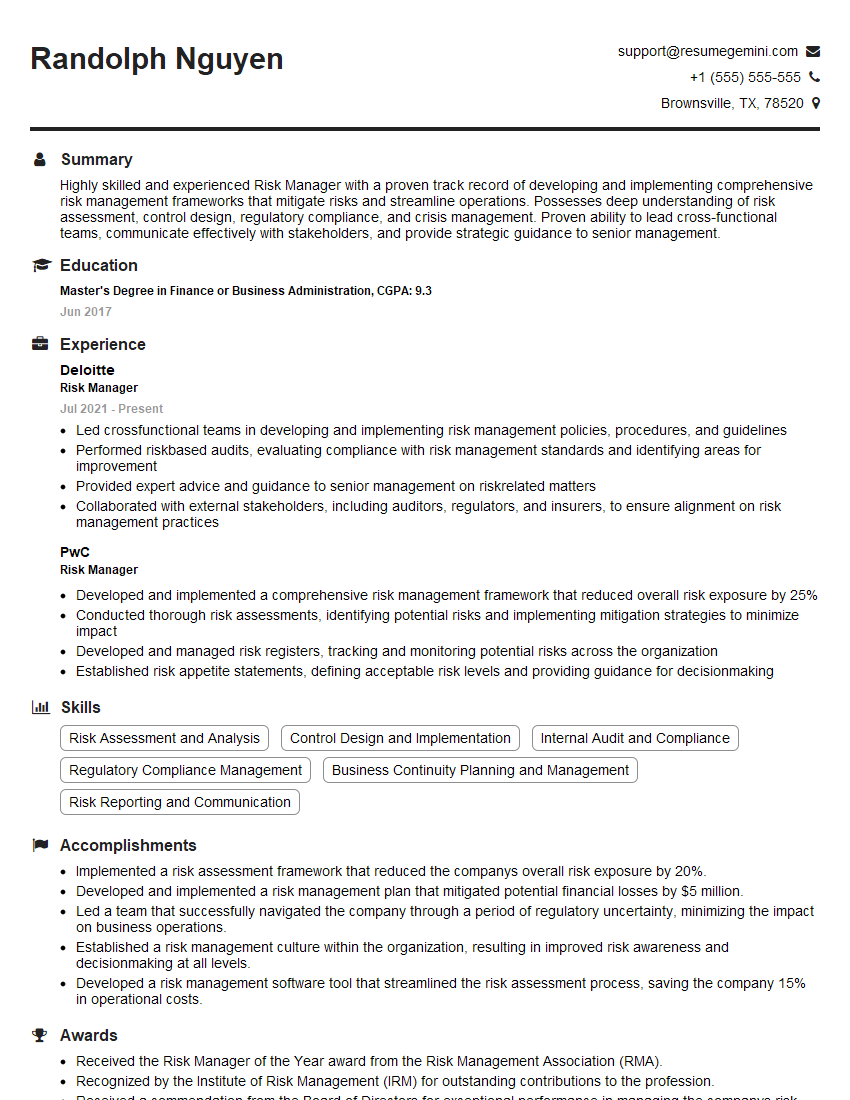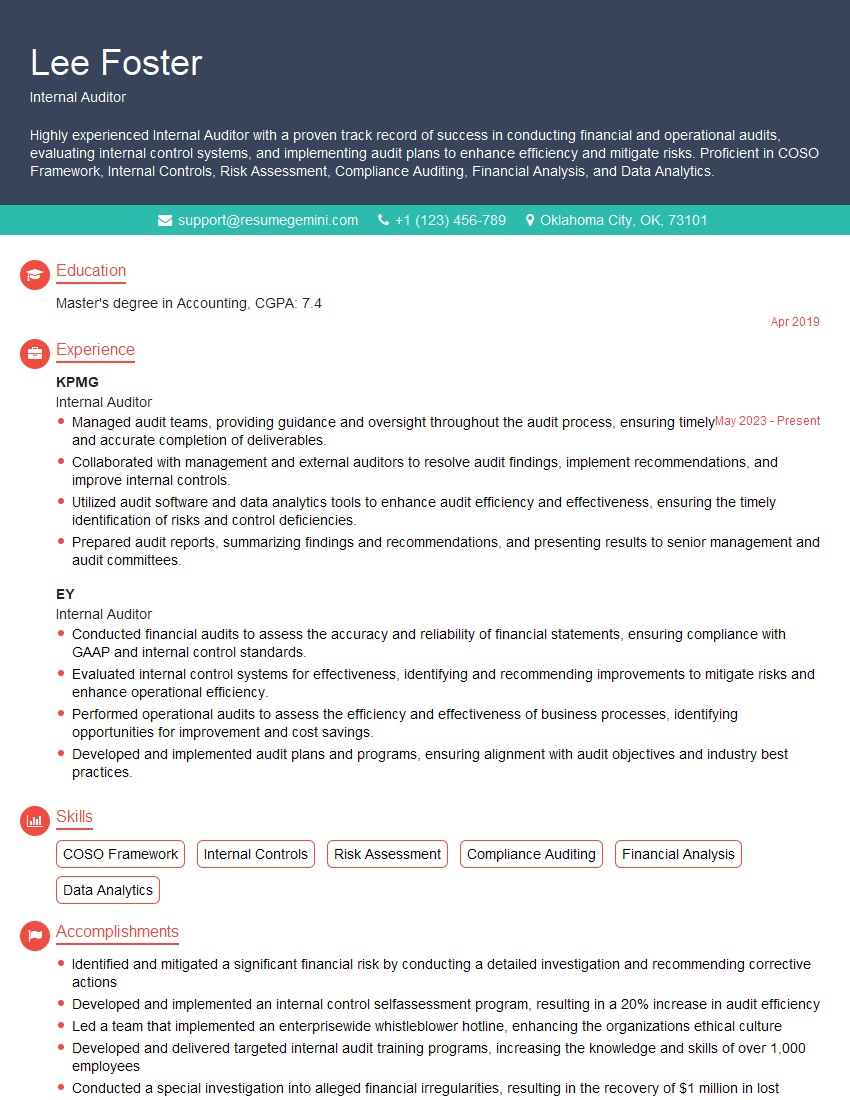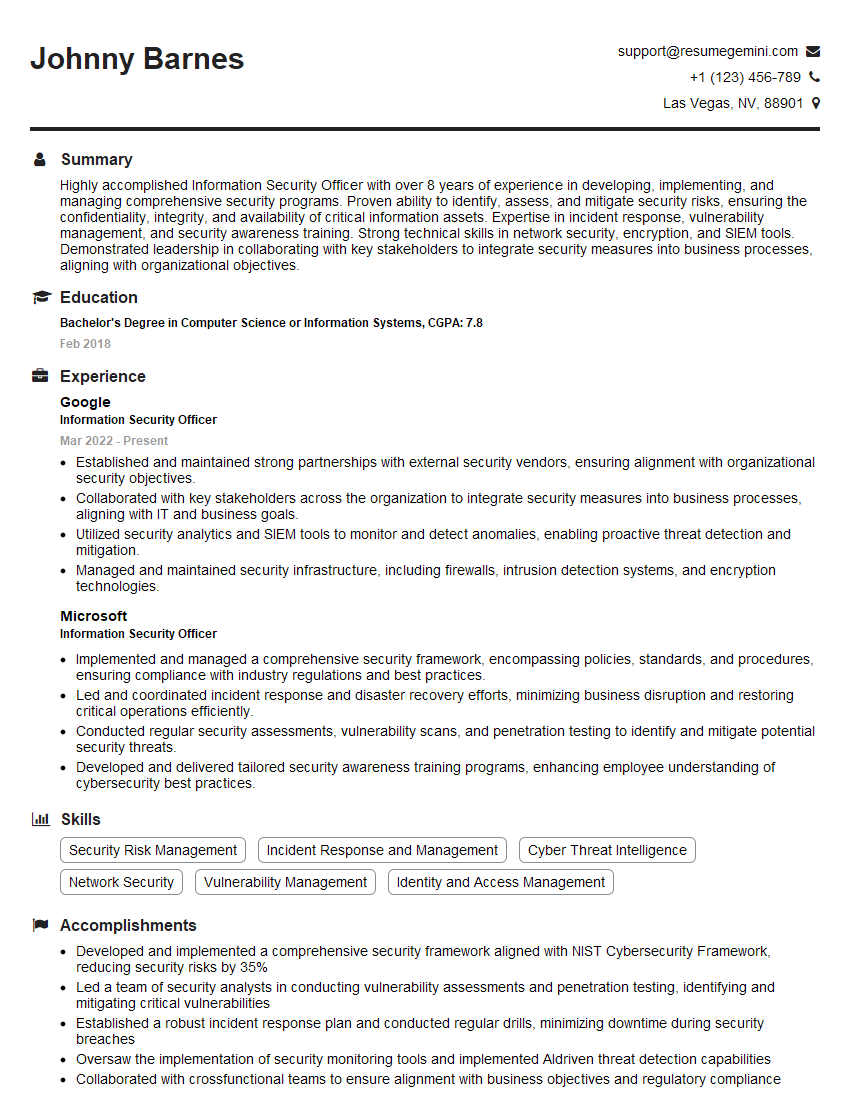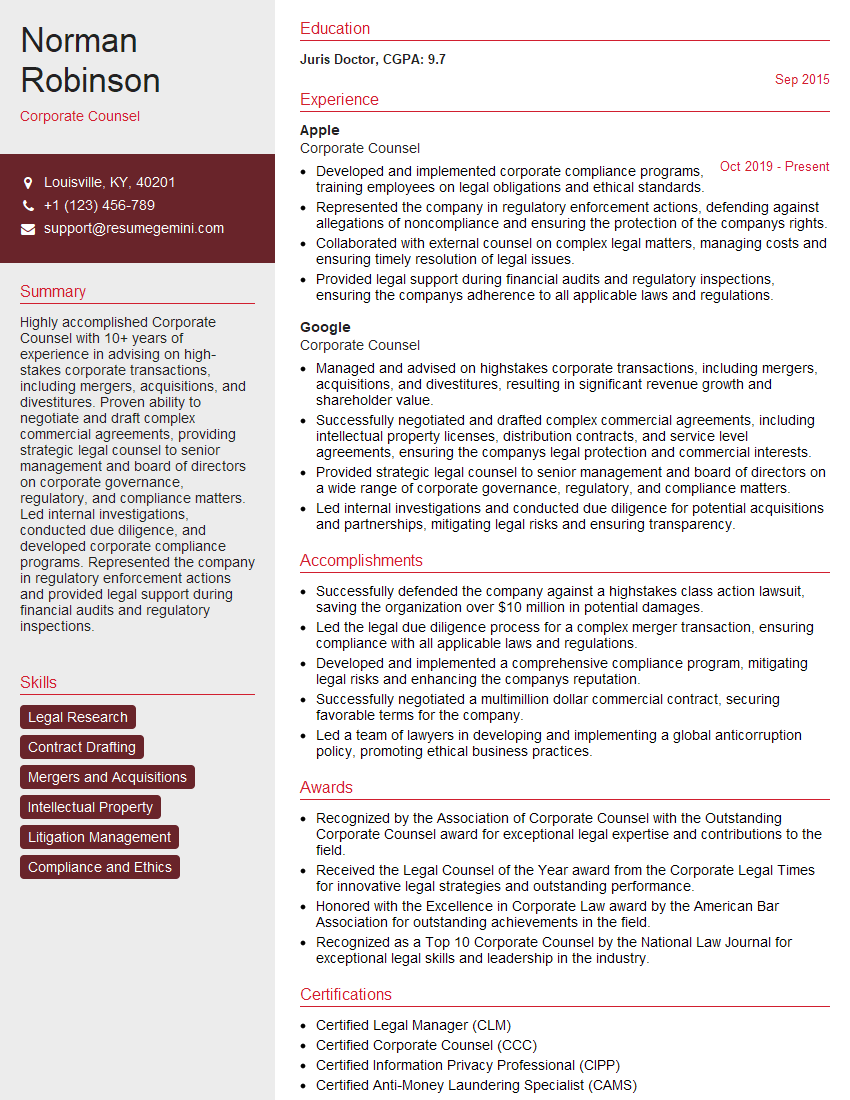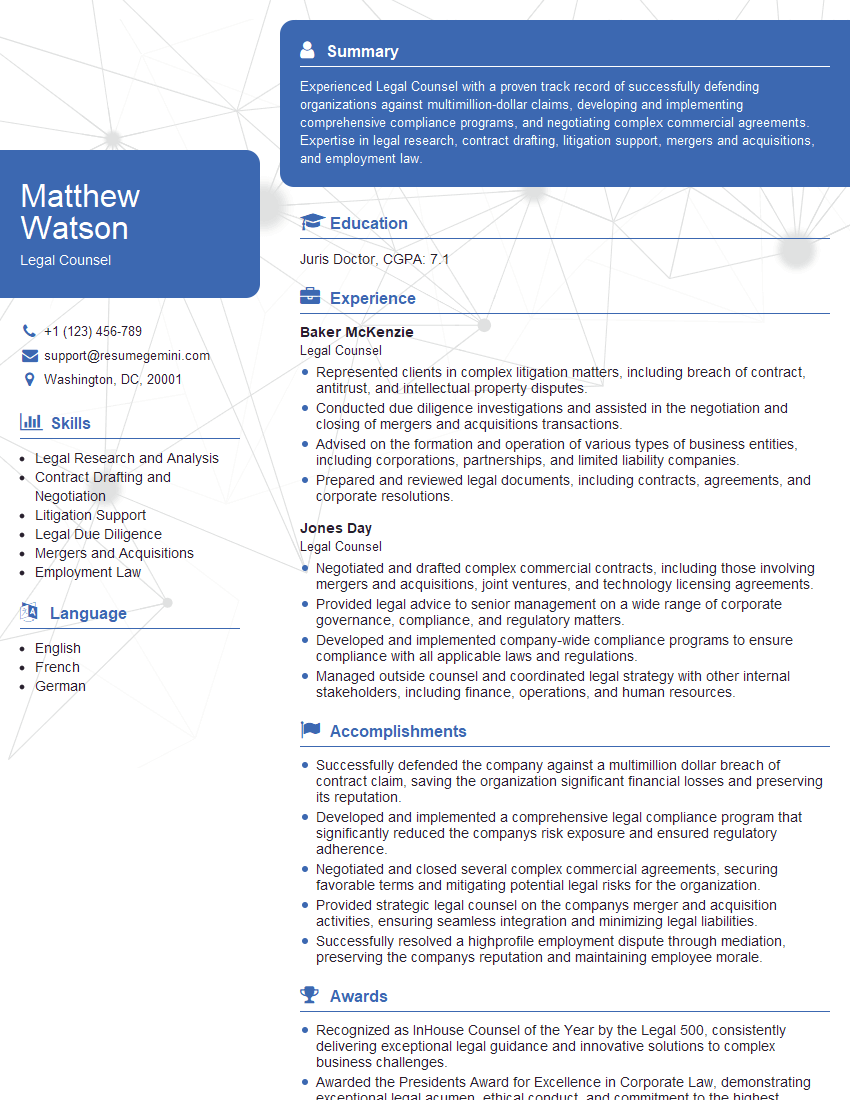Unlock your full potential by mastering the most common Mandated Reporting and Legal Responsibilities interview questions. This blog offers a deep dive into the critical topics, ensuring you’re not only prepared to answer but to excel. With these insights, you’ll approach your interview with clarity and confidence.
Questions Asked in Mandated Reporting and Legal Responsibilities Interview
Q 1. Define ‘mandated reporting’ and its legal basis.
Mandated reporting refers to the legal obligation of certain professionals to report suspected instances of child abuse, neglect, or elder abuse to the appropriate authorities. The legal basis varies by jurisdiction but generally stems from statutes designed to protect vulnerable populations. These laws are rooted in the parens patriae doctrine, which gives the state the power to act as a parent in the best interests of children and other dependent individuals. The rationale is that professionals in positions to observe potential harm have a responsibility to intervene, even if it means breaching confidentiality in certain circumstances. This is a balance between protecting individual rights and ensuring the safety and well-being of vulnerable populations.
Q 2. What are the key differences between mandatory and voluntary reporting?
The key difference between mandatory and voluntary reporting lies in the legal requirement. Mandatory reporting is legally mandated, meaning failure to report can result in severe penalties, including fines, suspension of licenses, or even criminal charges. Professionals in designated roles are required to report suspected abuse or neglect. Voluntary reporting, on the other hand, is not legally required. While encouraged to promote a safer environment, individuals are under no legal obligation to report. Think of it like this: mandatory reporting is like a traffic law—you must stop at a red light; voluntary reporting is like suggesting someone use a seatbelt—it’s good practice, but not legally mandated.
Q 3. List five situations requiring mandated reporting.
- Child abuse (physical, emotional, or sexual)
- Child neglect (failure to provide basic needs like food, shelter, or medical care)
- Elder abuse (physical, emotional, financial, or neglect of an elderly person)
- Domestic violence (physical or emotional abuse within a household)
- Suspected cases of human trafficking
The specific situations requiring mandated reporting may vary based on the state/jurisdiction and the professional’s role (e.g., teachers, doctors, social workers). It’s crucial to consult your state’s specific laws and regulations for a comprehensive list.
Q 4. Describe the legal consequences of failing to report mandated information.
The legal consequences of failing to report mandated information can be severe and vary depending on the jurisdiction and the specific circumstances. These consequences can include:
- Criminal charges, such as misdemeanor or felony charges
- Civil lawsuits from victims or their families
- Suspension or revocation of professional licenses, impacting the ability to practice
- Significant fines
- Loss of employment
It’s important to note that even a good faith belief of abuse that later proves to be unfounded typically does not result in penalties if the report was made in good faith and followed proper procedures.
Q 5. Explain the process of mandated reporting in your state/jurisdiction.
(This answer must be customized to reflect the specific state/jurisdiction of the interviewee. The following is an example and should be replaced with accurate details.) In California, mandated reporters must file a report with Child Protective Services (CPS) within 36 hours of suspecting child abuse or neglect. The report is usually made via a phone call and followed by a written report. Details regarding the child, the suspected abuser, and the nature of the abuse must be included. The mandated reporter is typically granted immunity from civil or criminal liability as long as they acted in good faith. Specific protocols vary depending on the type of abuse and the reporter’s profession. Professionals should familiarize themselves with the state’s specific reporting guidelines and resources to ensure compliance.
Q 6. How would you handle a situation where reporting might conflict with confidentiality?
Confidentiality is a critical ethical principle, but it is superseded by the legal obligation to report suspected abuse or neglect. When faced with this conflict, prioritizing mandated reporting is paramount. However, the reporter should only disclose the minimum necessary information to fulfill the legal obligation. For example, in therapy, instead of disclosing specific details of a patient’s account that might breach confidentiality, a therapist could report that the patient described experiencing harm and requires a safety assessment. The goal is to protect the vulnerable individual while respecting the limits of legal requirements and maintaining the patient’s privacy as much as possible. Documenting the decision-making process thoroughly is crucial.
Q 7. What are the ethical considerations surrounding mandated reporting?
Ethical considerations in mandated reporting center around balancing the duty to protect vulnerable individuals with the respect for individual autonomy and confidentiality. Ethical dilemmas can arise in situations where the evidence is not conclusive, when reporting might negatively impact the family, or when the reporter feels conflicted about betraying a client’s trust. Ethical decision-making frameworks, such as considering the potential consequences of action and inaction for all parties involved, are vital. Continual professional development and supervision can help navigate these complex scenarios. Seeking advice from supervisors or ethical review boards can also ensure responsible and ethical reporting practices.
Q 8. How do you ensure accuracy and completeness in your mandated reporting?
Ensuring accuracy and completeness in mandated reporting is paramount. It involves a multi-step process focusing on meticulous data collection, verification, and documentation. Think of it like building a strong foundation for a house – each brick (piece of information) must be carefully placed.
- Data Collection: I utilize structured forms and checklists to ensure all necessary information is gathered. This prevents omissions and inconsistencies. For example, in a child abuse case, this would include the child’s name, age, location, the nature of the abuse, and witness details.
- Verification: I cross-reference information from multiple sources whenever possible to corroborate facts. This might involve speaking to multiple witnesses or reviewing medical records. This is crucial in preventing false accusations or incomplete reporting.
- Documentation: Every step of the process is meticulously documented, including the date and time of the report, the source of information, and any actions taken. I maintain a secure and organized system for storing these records, ensuring they are readily accessible if needed. This could be a digital database or a locked filing cabinet depending on the context.
- Timeliness: Mandated reports often have strict deadlines. I prioritize timely submission to ensure that appropriate interventions can take place without delay.
By following this systematic approach, I ensure the accuracy and completeness of my mandated reports, minimizing the risk of errors and omissions.
Q 9. Describe your experience documenting and maintaining records of mandated reports.
My experience in documenting and maintaining records of mandated reports involves utilizing both digital and physical methods, depending on the regulatory requirements and the sensitivity of the information. Think of this as a robust system ensuring traceability and security.
- Secure Digital Databases: I’ve used secure, password-protected databases that track reports, their status, and any associated documentation. These databases often have audit trails, showing who accessed, modified, or deleted information.
- Physical File Storage: For highly sensitive or confidential information, I’ve utilized locked filing cabinets and secure storage facilities in compliance with relevant data privacy regulations. This might include reports relating to vulnerable individuals requiring anonymity.
- Metadata and Indexing: I ensure detailed metadata is attached to each report, making it easy to search and retrieve information when necessary. This makes locating specific reports quicker and easier.
- Version Control: For digital records, I use version control systems to track changes and revert to previous versions if necessary, ensuring the integrity of the data.
In all cases, data security and confidentiality are paramount. I follow strict protocols to protect the privacy of individuals involved in the reported events. This adherence to confidentiality is an absolute ethical and legal necessity.
Q 10. How do you stay current on changes in mandated reporting laws and regulations?
Staying current on changes in mandated reporting laws and regulations is an ongoing process requiring continuous vigilance. It’s like keeping up with a constantly evolving landscape.
- Professional Development: I regularly attend continuing education workshops and conferences focused on updates in relevant legislation and best practices.
- Subscription to Legal Updates: I subscribe to professional journals and legal newsletters that provide regular updates on changes in relevant laws and regulations.
- Government Websites: I regularly review the websites of relevant government agencies (e.g., state health departments, child protective services) to access updated guidelines and regulations.
- Professional Networks: I maintain a professional network with colleagues in my field to share information and best practices regarding mandated reporting updates.
Proactive monitoring of these resources helps me ensure compliance with the most current legal requirements and adapt my reporting practices accordingly.
Q 11. What is your understanding of the legal concept of ‘duty to report’?
The legal concept of ‘duty to report’ refers to the legal obligation of certain professionals to report suspected instances of child abuse, elder abuse, neglect, or other specified harms to the appropriate authorities. Think of it as a societal responsibility to protect vulnerable individuals.
Failure to fulfill this duty can result in legal consequences, including fines, suspension of licenses, and even criminal charges. The specific details of the duty to report, such as who is mandated to report, what constitutes reportable abuse, and the reporting procedures vary depending on jurisdiction and the specific type of abuse.
Professionals such as teachers, doctors, social workers, and nurses are commonly included amongst those with a duty to report.
Q 12. How do you balance the duty to report with potential harm to the individual?
Balancing the duty to report with the potential harm to an individual is a complex ethical and legal challenge requiring careful consideration. It’s a delicate balancing act.
The primary consideration is the well-being and safety of the vulnerable individual. If there is a reasonable suspicion of abuse or neglect, the duty to report typically outweighs the potential for causing distress or inconvenience. However, I would carefully assess the situation to ensure that the report is made only when there is a reasonable basis for suspicion, to avoid unnecessary interference.
In cases where there’s uncertainty, I would consult with supervisors, legal counsel, or other professionals experienced in mandated reporting to determine the best course of action. Documentation of this consultation process is critical.
Q 13. Have you ever been involved in a situation requiring mandated reporting? Describe the process.
Yes, I was once involved in a situation requiring mandated reporting. I was working as a social worker when I received a report from a concerned neighbor about potential neglect of an elderly client.
Following our agency’s protocol, I conducted a thorough assessment, documenting my observations and the client’s condition. I found evidence supporting the neighbor’s concerns. I then immediately reported my findings to Adult Protective Services, providing them with all the relevant documentation and ensuring a safe and timely intervention. I followed up with the agency to ensure the report was properly received and action was taken. The whole process emphasized the importance of collaboration and timely intervention to protect the well-being of the vulnerable client.
Q 14. What specific legal requirements apply to mandated reporting in your field?
The specific legal requirements for mandated reporting vary significantly depending on the jurisdiction and the type of abuse or neglect. For instance, reporting requirements differ substantially between child abuse, elder abuse, and domestic violence.
In my field (let’s assume social work), common legal requirements include:
- Identification of Reportable Events: A clear definition of the types of abuse or neglect that require reporting (e.g., physical, emotional, sexual abuse; neglect).
- Reporting Procedures: Specific instructions on how and to whom reports must be made (e.g., phone call, written report, online portal).
- Confidentiality and Privacy: Regulations around maintaining the confidentiality of the individual involved, while still meeting the legal requirement to report.
- Immunity from Liability: Provisions outlining protection from legal liability for mandated reporters who make good-faith reports, even if the report is later found to be inaccurate.
- Penalties for Failure to Report: Clearly defined legal penalties for failing to report suspected abuse or neglect.
It is crucial to stay updated on these regulations as they can change frequently. Regular review of relevant legislation and guidelines is essential for maintaining compliance.
Q 15. How would you handle a situation where you suspect a violation but lack definitive proof?
Suspecting a violation without definitive proof is a challenging but common scenario in mandated reporting. The key is to document thoroughly and act proportionally to the level of suspicion. I wouldn’t rush to make a report based solely on hunch, but neither would I ignore credible concerns. My approach would involve:
- Detailed Documentation: I would meticulously document all observations, conversations, and any other relevant information, noting dates, times, individuals involved, and specific details of the suspected violation. This documentation becomes crucial if the suspicion later proves valid.
- Seeking Consultation: I would consult with my supervisor or a legal expert within the organization to discuss the situation and explore next steps. They can offer guidance on whether the evidence meets the threshold for reporting and help navigate the complexities of the situation.
- Further Investigation (if appropriate): Depending on the nature of the suspected violation and organizational policies, I might discreetly conduct further investigation to gather more evidence. This could involve reviewing documents or speaking to additional individuals.
- Risk Assessment: I would carefully assess the potential risk to the individual(s) involved. If there’s an immediate threat, I would prioritize their safety and potentially report based on reasonable suspicion, acknowledging the lack of definitive proof in the report itself.
For example, if I suspected child neglect but lacked concrete evidence of harm, I’d thoroughly document my observations (e.g., child’s appearance, living conditions), consult my supervisor, and potentially work with child protective services to conduct a safety assessment.
Career Expert Tips:
- Ace those interviews! Prepare effectively by reviewing the Top 50 Most Common Interview Questions on ResumeGemini.
- Navigate your job search with confidence! Explore a wide range of Career Tips on ResumeGemini. Learn about common challenges and recommendations to overcome them.
- Craft the perfect resume! Master the Art of Resume Writing with ResumeGemini’s guide. Showcase your unique qualifications and achievements effectively.
- Don’t miss out on holiday savings! Build your dream resume with ResumeGemini’s ATS optimized templates.
Q 16. What are the potential repercussions of false reporting?
False reporting carries severe consequences, both professionally and legally. The repercussions can include:
- Disciplinary Action: This could range from reprimands and loss of privileges to termination of employment.
- Legal Sanctions: Depending on the nature of the false report and jurisdiction, legal action may be taken, including fines or even criminal charges (e.g., perjury or defamation).
- Damage to Reputation: A false report can severely damage an individual’s or organization’s reputation, creating mistrust and impacting future opportunities.
- Erosion of Trust: False reports undermine the credibility of the mandated reporting system, making it harder for genuine cases to be addressed effectively.
Imagine falsely accusing a colleague of child abuse. The damage to their personal and professional life would be immense, and you would face significant legal and professional consequences. The importance of thorough investigation and verification before reporting cannot be overstated.
Q 17. Describe your understanding of whistleblower protection laws.
Whistleblower protection laws are designed to safeguard individuals who report suspected illegal or unethical activities within their organizations. These laws vary by jurisdiction but generally offer protections against retaliation, such as:
- Job Protection: Preventing termination, demotion, or other adverse employment actions.
- Legal Protection: Providing legal recourse for those who experience retaliation.
- Confidentiality: Protecting the identity of the whistleblower to the extent possible.
However, it’s crucial to understand that these protections aren’t absolute. The report must be made in good faith, and there are usually specific procedures that must be followed. Moreover, the specifics of whistleblower protection will vary based on the type of violation reported and the jurisdiction.
For instance, the Sarbanes-Oxley Act in the US protects whistleblowers reporting financial fraud within publicly traded companies. Similar laws exist in many countries, although their scope and specifics can differ significantly.
Q 18. Explain the difference between mandated reporting and internal reporting procedures.
Mandated reporting and internal reporting are distinct but related processes. Mandated reporting refers to the legal obligation to report certain types of incidents to external authorities, such as child abuse or elder neglect. Failure to comply with mandated reporting laws can result in legal penalties. Internal reporting, on the other hand, involves reporting concerns or violations to internal channels within the organization, such as a supervisor, HR department, or ethics hotline. This process is often a first step before deciding whether or not to make a mandated report. Internal reporting might be mandatory for certain issues, but generally doesn’t carry the same external legal ramifications as mandated reporting.
Think of it this way: mandated reporting is about fulfilling a legal obligation to protect vulnerable individuals, while internal reporting is about addressing issues within the organization and potentially preventing future occurrences.
Q 19. How would you handle a situation involving conflicting mandated reporting obligations?
Conflicting mandated reporting obligations are rare but can arise. For example, a therapist might learn of a crime from a client while also being bound by confidentiality. In such cases, the primary focus should be on prioritizing the protection of life and safety. Legal counsel should be sought immediately to navigate the conflicting obligations. The guiding principle is to act in a way that minimizes harm and adheres to the relevant laws to the greatest extent possible. Thorough documentation of all actions and consultations with legal professionals is critical.
This is a complex situation that demands careful analysis of the specific laws and ethical considerations involved. A case-by-case approach is necessary, and consultation with legal counsel is paramount.
Q 20. What steps would you take to ensure the safety of a vulnerable individual requiring mandated reporting?
Ensuring the safety of a vulnerable individual requiring mandated reporting is paramount. My actions would include:
- Immediate Assessment of Risk: Evaluate the immediate danger to the individual. If there’s imminent threat, immediate action is necessary, possibly involving contacting emergency services.
- Contacting Appropriate Authorities: Report the situation to the relevant mandated reporting agency (e.g., child protective services, adult protective services) following established procedures.
- Documentation: Meticulously document all actions taken, including the date, time, individuals involved, and specifics of the situation.
- Collaboration: Work with the relevant agencies to ensure the individual’s safety and well-being. This might involve participating in investigations or providing further information.
- Following Up: Monitor the situation to ensure the individual receives appropriate support and protection.
For instance, if I witnessed signs of domestic violence, I’d immediately call emergency services, then report the incident to the appropriate authorities, documenting the incident and offering any necessary testimony.
Q 21. How would you prioritize multiple mandated reporting obligations?
Prioritizing multiple mandated reporting obligations requires a systematic approach. I would prioritize based on:
- Immediacy of Risk: Situations posing the most immediate threat to life or safety would take precedence. For example, a child in immediate danger requires immediate action, even if another mandated report is pending.
- Severity of the Violation: More serious violations (e.g., severe abuse) take precedence over less serious ones (e.g., minor neglect).
- Legal Requirements: Reports with stricter legal deadlines or penalties would be prioritized.
- Resource Availability: Consider the resources required for each report and prioritize those where immediate action can be taken.
This is a situation that benefits from a clear and organized system for tracking reports and their associated deadlines and risks. Using a reporting management system with clear workflows is crucial for this task.
Q 22. What resources do you utilize to stay informed on relevant laws and regulations?
Staying current with mandated reporting laws and regulations requires a multi-faceted approach. I rely on a combination of resources to ensure I’m always informed.
- Official Government Websites: I regularly check the websites of relevant government agencies, such as the Department of Health and Human Services (if applicable), state licensing boards, and other regulatory bodies. These sites often publish updated laws, regulations, and guidance documents.
- Professional Organizations: Membership in professional organizations related to my field (e.g., social work, healthcare) provides access to newsletters, webinars, and conferences that discuss current legal developments and best practices. These are invaluable for staying updated on case law and changes in interpretation.
- Legal Databases and Journals: I utilize legal databases like Westlaw or LexisNexis to access case law, statutes, and legal commentary. Reading relevant legal journals keeps me informed about recent court decisions and legal scholarship interpreting mandated reporting laws.
- Continuing Education: I actively participate in continuing education courses and workshops focused on mandated reporting and legal updates. This ensures my knowledge remains current and compliant with evolving standards.
This layered approach allows me to not only learn about changes in the law but also to understand the practical implications and nuances in different situations. For example, recent changes in privacy regulations have significant impacts on how we handle mandated reports, and staying informed on these changes is critical.
Q 23. Describe a time you had to explain complex legal information to someone with limited legal knowledge.
I once had to explain the nuances of child abuse reporting laws to a concerned family member who was unsure whether a situation warranted a report. They were understandably upset and confused, and lacked legal training.
My approach was to use clear, simple language, avoiding legal jargon. I explained the legal definition of child abuse in our state, highlighting the specific behaviors that constitute abuse, using real-life examples that were age-appropriate and not excessively graphic. I explained that mandated reporters have a legal obligation to make a report when there is reasonable suspicion of abuse.
I also emphasized the importance of reporting as a protective measure for children and that making a report doesn’t necessarily mean that the child will be removed from the home. It simply initiates an investigation to ensure their safety. To alleviate their anxieties, I explained the process after a report has been made, in simple terms and step-by-step. Finally, I provided them with resources such as the local child protective services’ number, showing a path to take if needed. By focusing on the well-being of the child and offering support, I helped them understand the legal requirements and their importance.
Q 24. How would you ensure the confidentiality of a mandated report while fulfilling your legal obligations?
Maintaining confidentiality in mandated reporting is paramount while fulfilling legal obligations. This requires a careful balance.
- Limited Information Sharing: I only share the minimum necessary information with the appropriate authorities. This means avoiding unnecessary details or identifying information beyond what’s legally required for the report. For example, in a case of suspected elder abuse, I would report the suspected abuse, but only share identifying details if it is crucial for the investigation.
- Secure Reporting Mechanisms: I utilize secure reporting systems and channels provided by the relevant agencies. This helps to prevent unauthorized access or disclosure of sensitive information. This might involve electronic reporting systems with encrypted data.
- Strict Adherence to Privacy Laws: I meticulously follow all applicable privacy laws, such as HIPAA (if applicable) and state-specific confidentiality regulations. This includes adhering to protocols for data storage, access control, and information disposal.
- Documentation and Audits: I maintain accurate and detailed records of all reports, including who was notified, when, and what information was shared. This helps to ensure accountability and allows for auditing to ensure compliance.
Essentially, it’s about striking a balance between fulfilling the legal obligation to report and protecting the privacy rights of the individuals involved. The core principle is to only share information necessary for the investigation and to do so through secure and legally compliant channels.
Q 25. How do you maintain professional objectivity when dealing with sensitive information?
Maintaining professional objectivity when dealing with sensitive information is crucial to ensure fairness and accuracy in reporting. This is achieved through:
- Awareness of Personal Biases: I am constantly mindful of my own personal biases and preconceptions, actively working to mitigate their influence on my assessment and reporting. I strive to approach every case with an open mind and objectively evaluate the evidence.
- Focus on Facts: I meticulously document the facts of the situation as observed and reported, avoiding speculation or subjective interpretations. My reports reflect only verifiable information.
- Evidence-Based Decision-Making: I base my reporting decisions on clear evidence and established criteria for mandated reporting. Emotions are secondary; the facts and the legal requirements are paramount.
- Seeking Supervision When Needed: In challenging cases, where my own objectivity may be compromised, I seek guidance and supervision from colleagues or supervisors to ensure that my decisions are unbiased and legally sound.
For example, if I have a personal connection to someone involved in a mandated reporting situation, I will actively recuse myself from the case to avoid any potential bias. Objectivity is not just a virtue, it is a necessity for effective and legal mandated reporting.
Q 26. What are the potential legal ramifications of failing to comply with mandated reporting guidelines?
Failing to comply with mandated reporting guidelines can have serious legal ramifications, varying by jurisdiction and the specific circumstances.
- Civil Liability: Individuals may face civil lawsuits from those harmed by the failure to report, especially in cases involving injury or death. This could result in significant financial penalties.
- Criminal Charges: In some jurisdictions, failure to report can lead to criminal charges, including misdemeanor or felony offenses, resulting in fines, jail time, or both.
- Professional Sanctions: Professionals such as social workers, teachers, and healthcare providers could face disciplinary action from their licensing boards, such as suspension or revocation of their licenses. This can severely impact their career.
- Reputational Damage: Even if legal penalties are avoided, failure to report can severely damage a professional’s reputation, impacting their credibility and employability.
The potential consequences underscore the importance of understanding and complying with all applicable mandated reporting laws. The gravity of the potential outcomes necessitates thorough knowledge and careful attention to detail in every reporting instance.
Q 27. Describe your experience collaborating with legal professionals on mandated reporting issues.
My experience collaborating with legal professionals on mandated reporting issues has been invaluable.
In one case involving a complex situation with multiple potential legal interpretations, I collaborated closely with our organization’s legal counsel. We engaged in discussions to determine the exact legal requirements given the specifics of the case. Legal counsel provided clarification on aspects of the law and helped ensure that the report was legally compliant and correctly documented. This collaboration allowed me to balance my ethical responsibilities with strict legal requirements, ensuring the safety of the involved individuals while avoiding any legal missteps.
Generally, working with legal professionals ensures clarity regarding the legal nuances of mandated reporting. This collaborative approach aids in ensuring the reports are both ethically sound and compliant with the letter of the law. Regular consultation with legal counsel helps prevent missteps and provides valuable support in navigating the complexities of mandated reporting.
Key Topics to Learn for Mandated Reporting and Legal Responsibilities Interview
- Understanding Mandated Reporting Laws: Familiarize yourself with the specific legal requirements for reporting in your jurisdiction. This includes identifying different types of reportable events and the relevant agencies involved.
- Ethical Considerations: Explore the ethical dilemmas that can arise in mandated reporting situations, such as balancing confidentiality with the duty to report. Consider scenarios requiring difficult decisions and how to navigate them.
- Documentation and Record Keeping: Learn the importance of thorough and accurate documentation in mandated reporting cases. Understand best practices for maintaining records that are both legally sound and ethically responsible.
- Legal Protections for Reporters: Research the legal protections afforded to mandated reporters who act in good faith. This includes understanding limitations and potential liabilities.
- Practical Application: Case Studies: Review case studies to understand how mandated reporting laws are applied in real-world situations. Analyze the decision-making processes and outcomes to enhance your understanding.
- Different Reporting Scenarios: Prepare for diverse scenarios, considering the variations in reporting requirements based on the type of incident (e.g., child abuse, elder abuse, domestic violence), the age and vulnerability of the individual involved, and the setting (e.g., healthcare, education, social services).
- Professional Boundaries and Responsibilities: Understand the importance of maintaining professional boundaries and acting within your scope of practice when handling mandated reporting situations.
Next Steps
Mastering Mandated Reporting and Legal Responsibilities is crucial for career advancement in fields requiring ethical conduct and legal compliance. A strong understanding of these topics demonstrates professionalism, commitment to safety, and a proactive approach to risk management—highly valued attributes in many professions. To significantly enhance your job prospects, focus on creating an ATS-friendly resume that clearly showcases your relevant skills and experience. ResumeGemini is a trusted resource to help you build a professional and impactful resume. Examples of resumes tailored to Mandated Reporting and Legal Responsibilities are available to guide you.
Explore more articles
Users Rating of Our Blogs
Share Your Experience
We value your feedback! Please rate our content and share your thoughts (optional).
What Readers Say About Our Blog
This was kind of a unique content I found around the specialized skills. Very helpful questions and good detailed answers.
Very Helpful blog, thank you Interviewgemini team.
